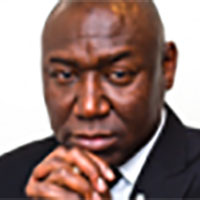We have long known it to be true that it is dangerous to be Black in America. We have all watched the cell phone video and body cam footage of unarmed Black men—with hands raised in surrender—shot and killed by police. We have seen people of color shot in the back by officers while running away and police officers taking on the role of executioner at routine traffic stops.
Study after study has shown that unarmed Black Americans are far more likely to be killed by police than whites.
In 2020, the familiar existential threat that envelops the lives of Black people—the one that prompts us to have “the talk” with our kids—fused with a new existential threat: COVID-19, which is killing Black people in America at an alarming and disproportionate rate.
I believe 2020 is a seminal year that will mark a turning point in America’s consciousness toward Black Americans and—we hope and pray—provide the impetus to change longstanding systems plagued by injustice and inequity.
This year began with much promise and optimism, but quickly gave way to unprecedented threats and unrelenting fear. We found ourselves faced with the mortal threat of a global pandemic that spread quickly and had no treatment or cure.
Quickly dubbed “the great equalizer,” at first, no data existed to show which segment of the population was most likely to be struck by the coronavirus. But as regional data started to be reported, it became clear that the same health disparities that put Black people at greater risk for so many diseases due to poverty, inadequate access to health care, and nutrition also made them more vulnerable to contracting and dying from COVID-19.
And then there were compounding issues of Black people disproportionately holding jobs that made them essential workers who could not isolate and work from home, disproportionately relying on crowded public transportation, and disproportionately living in crowded conditions. For all these reasons, COVID-19 cases among Black Americans continued to spike.
Once COVID-19 mutated with all the normal risks of being Black in America, it gave rise to novel threats. When Black men were stalked by a police officer at a Walmart for wearing surgical masks to prevent the transmission of the coronavirus, we saw once again that the rules are different for our community.
Absent an intensive effort to counteract the disparities facing communities of color, it became clear this devastation would rage alongside the dangers of racism—with the ruin recorded in body bags, battered lives, and broken communities.
Then George Floyd unwittingly stepped onto the world’s stage.
It was hard to imagine that in 2020 there could be an issue that would dominate and change the American consciousness as it relates to Black Americans in more profound ways than COVID-19. But the horrific video of a Minneapolis police officer pressing the life out of George Floyd for eight minutes and 46 seconds while a crowd of witnesses pleaded for his life and videotaped his death did just that and awakened America to racial injustice as nothing had before.
For weeks, Americans filled the streets in cities across the nation to protest the death, not only of Floyd, but of the countless Black men and women whose deaths were not caught on videotape and whose names never became trending hashtags. Black, white, Hispanic, and Asian, they poured out of their homes in the midst of a pandemic to proclaim: Black Lives Matter!
Suddenly, Black Lives Matter signs sprung up on the front yards of non-Black Americans in predominately white neighborhoods. Suddenly, Americans were having conversations about the need for police reform and racial inequities in our education and health care systems. Suddenly, people who hadn’t thought about it before began noticing the racial underpinnings of poverty and substandard housing that lead to mortal threats. Suddenly, people became woke to environmental racism and the ways some corporations market dangerous products to marginalized Black people for a profit. Suddenly, justice became about more than just police brutality.
It is highly likely that 2020 will not be remembered as the year America fixed its deep-rooted racial inequalities and turned the hearts of all Americans to love their brothers and sisters of all colors. But it may well be remembered as the year of a great awakening, when long overdue conversations happened and when “Black Lives Matter” became a call to action for more than just Black people.
When the pandemic is behind us and the final body count is in, I feel sadly certain that we will be confronted with a stark picture of the deadly effects of racial inequality.
Early in March, President Trump speculated that the ability of celebrities, athletes, and politicians to access coronavirus tests over poor and more vulnerable individuals was just “the story of life.” Let his words act as our clarion call. Let the legacy of 2020 be that it was the first chapter of our shared mission to rewrite the story of life in America.



